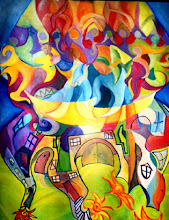
I'm just musing how the overwhelming experience of falling in love or being mutually attracted with someone, can reawaken the beauty of what it means to belong in general....
Maybe when we fall in love, we dramatically experience ourselves not as some isolated little ego but recognize a powerful togetherness. So our experience of limitation is transcended in that belonging. And we realize that our true self is not a product of alienation, but belonging, to another, to ourselves and ultimately to all that is.
The image from Paul Klee is so expressive...an intuition of limitlessness on the one hand, and grounding with the particular other.
To love, is a disposition... an attitude of the will. Greater than feelings, painful or like, that tend to reduce our consciousness back to that little isolated self.
Trust is more than another feeling, while rooted in feelings about who one is and who one encounters, it is also spelled out in the will: loving neighbor as oneself....so there is a relationship between trust and love, on a feeling level and on the level of the will, of the chosen disposition.
Maybe hope is an openness, too. Not just feelings for preferential outcomes but also a general disposition to be open to the surprise...so it has a transcendent aspect too.
I know these words are classical virtues...faith hope and love. But we don’t really necessarily know how to relate to them, either because they have never been brought down to earth, or because painful personal experiences can block access to thinking about them in ways that activate the right signals for us. I know I’m really working to...whatever the words may mean, to integrate...wholly.
If there is a broad orientation of psychology that would reduce different experiences of belonging- romance, passionate attraction to another, to the self defeating mental acrobatics of an isolated ego in the form of projection or illusion, maybe the roots of these viewpoints is some problem with method, strict old scientific method, isolating, measuring, cutting the self up into pieces of a solitary pie.
I thought about the orientation of addiction as the opposite of transcendence.
For the Jews, the notion of gods kingdom wasn't a place or a reign, but it apparently was a metaphor meant to evoke creative power acting on their behalf… so when Jesus preached it to the people who were with him, he really did mean: good things, life, are happening all around you- and within you. Wake up to your life.
So I pulled this prayer out from Theresa of Avila, Spanish mystic, doctor of the church. (One of three women, she was very special, beautiful, savvy, powerful and holy) It's so hard to relate to any religious word, I always feel the need to deconstruct and relate to it like something not quite belonging to me, but I find it is sometimes helpful, if properly deconstructed. so Christ only has meaning in the sense if I relate it to love that I know I've received, or given, persons that have changed my world in some way.
Christ has no body now on earth but yours;
yours are the only hands with which He can do His work.
Yours are the only feet with which He can go about the world;
yours are the only eyes through which His compassion can shine forth upon a troubled world.
Christ has no body on earth but yours.
Theresa of
I know of one means only by which to attain to perfection: LOVE. Let us love, since our heart is made for nothing else. Sometimes I seek another word to express Love, but in this land of exile the word which begins and ends (
Therese of Liseiux
My great ambition is to focus on the beauty and the mystery of Love, because that's what I was created to do.
“If you only knew what darkness I am plunged into! ...
The good God does not need years to accomplish His work of love in a soul; one ray from His Heart can, in an instant, make His flower bloom for eternity..."
